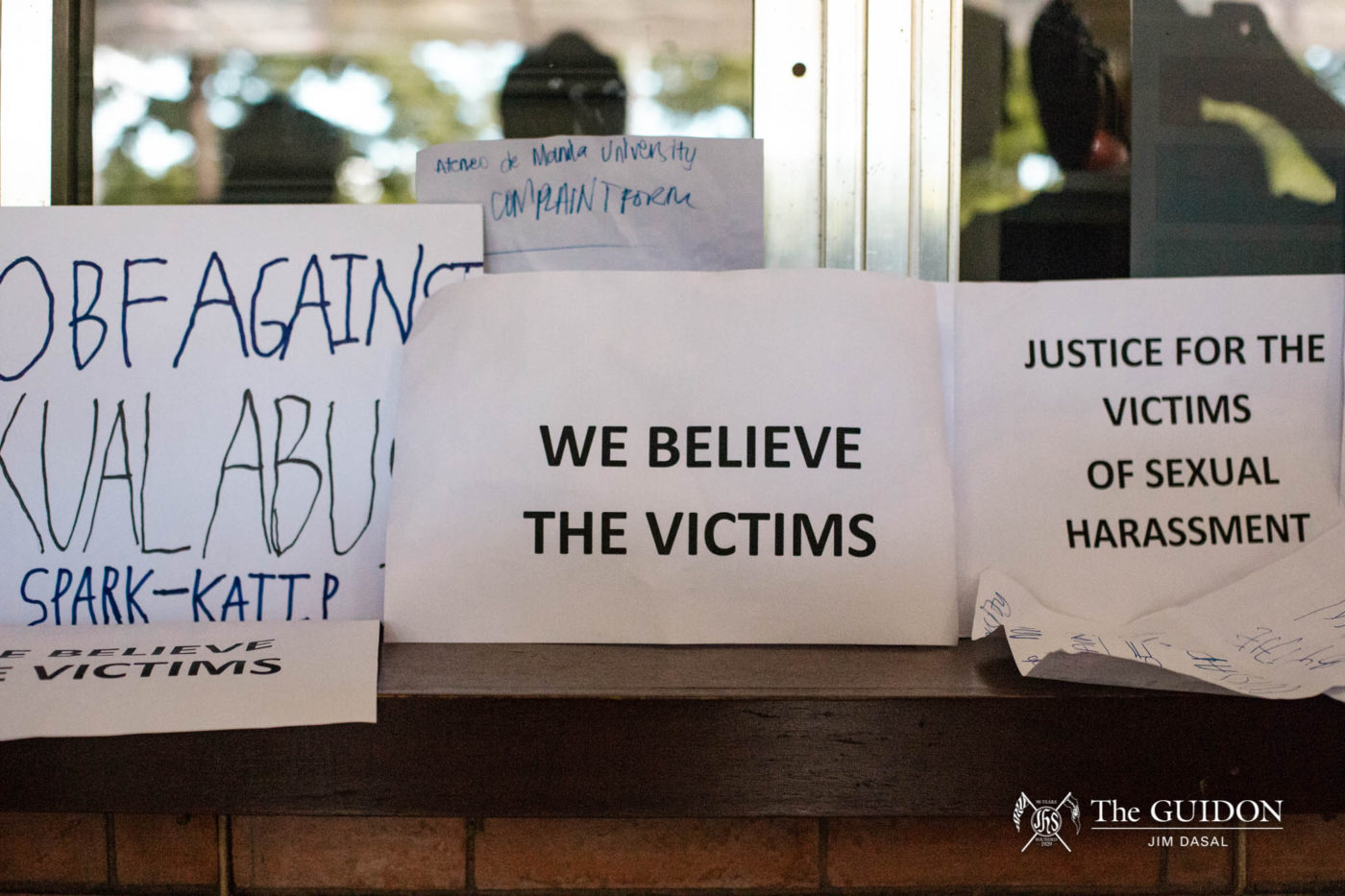AFTER THE recent uproar on the University’s response towards yet another sexual harassment allegation against a Loyola Schools (LS) professor, a closed-door dialogue between LS administrators, department faculties, and members of the Sanggunian took place on the morning of October 18 at the Office of the Vice President for the Loyola Schools. The agenda of the dialogue was to negotiate reforms in terms of the school’s approach towards handling sexual harassment cases.
After the meeting, Sanggunian President Quiel Quiwa said that one short-term solution currently on its way is the No-Contact Order. The Sanggunian has sent a petition to the Office of the Vice President for the Loyola Schools calling for a No-Contact Order between Jade Principe, PhD and his students. The Philosophy Department faculty member recently returned to his teaching duties despite the sexual harassment accusations that were posted about him on social media and anonymous online platforms last year.
However, Quiwa noted that no formal sexual harassment complaints against the professor have been filed and forwarded to Committee on Decorum and Investigation (CODI), meaning no case can be used against him.
“Siya ‘yung priority kasi ‘yung iba pang names na nagsurface over the past week hindi nagtuturo this semester (He is the main priority because the other names [of accused faculty members that surfaced] over the past week are not teaching this semester),” Quiwa said.
More solutions were later offered by University President Jose Ramon Villarin, SJ himself. His long-awaited statement acknowledged the “gaps and inadequacies” of the current systems that handle sexual harassment cases on campus.
Villarin said that he plans to establish an Office for the Protection of Minors and Vulnerable Adults under the Office of the President, among other initiatives.
Plans of action
The LS community’s demand for increased student safety measures against sexual harassment was also discussed. Aside from the creation of the Anti-Sexual Harassment Manual, Quiwa added that structural policy reforms will have to be made to CODI’s processes. However, Quiwa mentioned that these changes will still have to comply with the Safe Spaces Act. The implementation of the rules and regulations of the act is expected to be finalized by the end of October.
For both Quiwa and Villarin, the focus of the dialogue was the need for an external audit to review the Loyola Schools’ systems and processes for handling cases of sexual harassment.
Quiwa noted that while tentative partners are still being considered for the audit, the LS administration hopes to get the nearest educational institutions such as the University of the Philippines Diliman, Miriam College, and other institutions to provide assistance with reviewing new and existing policies on sexual harassment.
Furthermore, Sanggunian Department of Students Rights Chairperson Moirah Isabelo said that the administration has agreed to release the percentages of sexual harassment and sexual misconduct reports the Office of Human Resources Management and Organization receives once cases are officially filed.
However, Isabelo said that to address the call for increased transparency with regard to specific case processes and results, the LS administration still has to determine how to do so given the constraints of the Data Privacy Act, which prevents public disclosure of case investigation details and results.
For now, the Sanggunian is focused on releasing a document that will detail the University’s procedures for handling sexual harassment cases. This will be posted online in the coming weeks.
“We’re [going to] release a full document outlining the exact processes that sexual harassment cases undergo, including which committees these cases go to,” Isabelo said.
Staying informed
With the community’s call for rightful sanctions, Quiwa mentioned that the punishments for offenders found guilty of sexual misconduct will be discussed in another meeting with the LS administration. The punishments will be added either to the University Code of Conduct or the Code on Anti-Sexual Misconduct.
He added that the University’s Anti-Sexual Harassment Policy specifies the procedures for complaints of sexual harassment, as well as the rights that protect both parties during the course of the investigation.
At present, the Sanggunian is working on making both documents more “digestible” for students: “Para alam ng mga students na mayroon tayong document na nagsasabi kung ano ‘yung dapat na sanctions (Students should know that we have documents that explain what the appropriate sanctions are.)”
According to Quiwa, the Sanggunian also hopes to organize an open forum that can serve as a platform for students to voice out their concerns, grievances, and suggestions on the issue.
“We’d like to know from the students [what agenda they would like to present]. It’s difficult for us to set [objectives] on our own,” he said. “Sanggu will make sure na [the agendas set] will follow through. [The discussion] doesn’t end with this meeting.”







